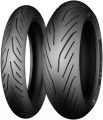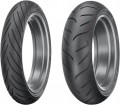Recommended axle
The axle on which this tyre is recommended to be mounted.
In the vast majority of modern motorcycles, the
front wheel is steering, and the
rear wheel is driving; in addition, the rear wheel usually bears more weight. Accordingly, the features of the work of both axes will also be different. So, the front tyre has to turn in different directions along the course, and the rear one has to be subjected to increased loads in terms of weight and twisting along the main axis of rotation, in addition, it must “cling” well to the road in order to avoid slipping. In light of all this, putting tyres on a "non-native" axle is highly undesirable: it will work in an emergency mode, and the consequences can be very deplorable. At the same time, there are
universal models suitable for both the front and rear axles (although they can cost more than specialized ones, and at an equal cost, they can be inferior to them in terms of individual characteristics).
Width
Nominal tyre width (section width) in millimetres. This is one of the notation options; in addition to it, there may also be a designation in inches, for more details, see "Width" above.
Width — whether in millimetres or inches — is one of the parameters that determine compatibility with a particular rim (the other parameter is the fit diameter, see above about it). The main criterion for choosing a tyre in width is the manufacturer's recommendations for a given motorcycle model. It is highly undesirable to deviate from these recommendations: although some types of motorcycles (for example, road bikes) allow a width deviation of +/— 10 mm on the rear wheel, such a wheel will still function in a mode that differs from the standard one. On the front wheel, no deviations are allowed at all.
Profile
Tyre profile height. This parameter is specified as a percentage of the profile width (see above).
The higher the profile, the better the motorcycle can carry heavy weight and increased loads when driving on rough roads and the lower its stability at high speeds. Therefore, for high-speed driving on high-quality flat tracks, hard-surface motorcycle tracks, etc. use ultra-low-profile rubber, with a profile height of up to 60%. For most east european roads, given their overall quality, rather low-profile tyres are recommended — 60 — 80%. And tyres with a profile height of more than 80% should be chosen when the key points are not speed, but cross-country ability and resistance to stress.
Now on the market there are tyres with the following profile height:
40%,
50%,
55%,
60%,
65%,
70%,
75%,
80%,
90%,
100%.
Load index
The load index indicates
the maximum weight load that the tyre can safely carry in normal operation. To shorten the marking, this parameter is denoted by a two-digit number; you can translate this designation into a specific weight in kilograms using special tables.
This value must not be exceeded — otherwise the tyre may burst at any time due to off-design loads. At the same time, when choosing motor tyres for this parameter, it is worth remembering that the load is distributed unevenly between the front and rear wheels. However, the task is facilitated by the fact that motorcycle manufacturers can indicate the minimum or recommended load indices for the front and rear axles in the documentation for their equipment.

